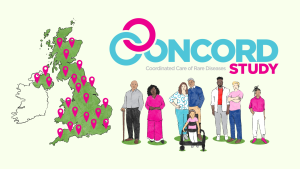It is important to us that our work is evidence-based and knowledge-generating, and we carry out research to support our policy work and our members.
Much of our research is about understanding people’s experience of living with their genetic or rare condition, or their loved one’s condition – how it affects them and what their interactions with the NHS and other services are like.
Our research priorities are to study the most important cross-cutting issues that affect people living with genetic and rare conditions and these align with our 5-year strategy.
Completed research projects
In the last few years we have completed studies into mental health, diagnosis and coordination of care (the CONCORD study). Our findings have fed into our recent policy reports and engaging animations and illustrations, listed below. We also publish scientific papers to raise awareness of genetic and rare conditions among academics and healthcare professionals.
CONCORD: CoOrdiNated Care of Rare Diseases animation and illustration (2023)
Coordinating Care: learning from the experiences of people living with rare conditions (2023)
Good Diagnosis (2022)
Living with a rare condition: the effect on mental health (2018)

Current research projects
Our current research projects are:
- Rapid genome sequencing (rGS) – this is an evaluation, from the perspective of parents and healthcare professionals, of a new service that offers rapid turn-around whole genome sequencing to seriously ill children in hospital. This project is led by Great Ormond Street Hospital NHS Foundation Trust and the Institute of Child Health.
- Generation Study evaluation – this is an evaluation of the pilot ‘Generation Study’ run by Genomics England, to assess it in terms of parent experiences, healthcare professional views, and health economics.
Patient and public involvement
We actively support individuals and family members affected by genetic, rare and undiagnosed conditions to become partners in research through patient and public involvement (PPIE) and we support researchers to develop good PPIE practice.
We are currently delivering patient and public involvement support as an integral part of the following research projects:
Rare Disease Research UK hub – This is a £14 million investment into rare conditions research funded by the National Institute for Health Research and the Medical Research Council. The aim of the new platform (‘hub’) is to bring together expertise from across the UK rare disease research system to foster new and innovative treatments for those directly and indirectly impacted by rare conditions. It will overcome some of the most common challenges in the diagnosis, management and treatment of rare diseases. We are promoting good PPIE practice for rare conditions through our role with the coordinating hub, and across the eleven research sites (‘nodes’). In addition we are also directly involved in delivering PPIE work for three of the nodes:
CAPTIVATE – innovative trial design, led by University of Birmingham
UPNAT – nucleic acid therapy, led by UCL
ELSI – ethical, legal and social issues, led by University of Manchester
ARDAT – The ARDAT (Accelerating Research & Development for Advanced Therapies) project is a £25 million investment by an international consortium of participants with track records in the field of advanced therapies. Advanced therapy medicinal products (ATMPs) such as cell and gene therapies have the potential to revolutionise treatments for many serious genetic conditions. However, developing ATMPs is extremely challenging as it is hard to know which patients will respond well to an advanced therapy and which will experience serious side effects. ARDAT will focus on rare conditions caused by a single gene mutation. It will deliver tools and knowledge to assess: how treatments are broken down by the body; which treatments are likely to trigger a harmful response; how best to deliver the therapy; how to assess safety and efficacy of ATMPs; and how to determine how many doses a patient will need to obtain a lasting improvement in their health. Finally, ARDAT will work closely with regulators on regulatory harmonisation for ATMPs.
Contact us if you are interested in finding out more about our current research projects.
Overview of UK rare disease research landscape
In 2023 a detailed view of the UK’s rare disease research landscape was published by the National Institute for Health Research (NIHR), in collaboration with the Medical Research Council (MRC), industry, charities and devolved administrations.
It covers a five-year period from 2016 – 2021 and presents a clear overall picture of the rare disease research taking place across the UK, where it was happening and who funded it. You can find out more about their work mapping the rare disease research landscape.
Challenges for genomic research
The UK is world-leading in genomic research and how it can be applied to health services.
But the valuable databases we have developed for genomic research tend to include more data from people with white European heritage.
We can only make sure genomic research represents and benefits everyone if databases include data that is more representative of the UK population, so that important findings specific to people with different ancestries are not missed.
Our member group The Grace Project has produced a short video to illustrate the issues. You can also read about the Diverse Data initiative at Genomics England.
Research into new treatments for specific genetic and rare conditions
We are often asked whether research is taking place to identify new treatments for a particular genetic or rare condition.
Clinical trials for new treatments for genetic and rare conditions often involve patients who are living in a number of different countries. This is because the number of people living in each country with a particular condition may be small, and there may only be one or two specialist centres in each country with the technical expertise needed to support the trial.
The international nature of clinical trials for rare conditions means that the best place to find information about clinical trials of new treatments is through a US site called clinicaltrials.gov. You can search by the name of the condition, and the website will tell you whether any clinical trials are taking place. If a trial is taking place, you can click on the name of the trial to find out which specialist centres in which countries are enrolling patients into the trial.
Building an evidence base on genetic and rare conditions
We have recently led on or co-authored the following scientific papers.
Care coordination
- Morris, S., et al. (2024). ‘Preferences for coordinated care for rare diseases: a discrete choice experiment.’ Orphanet Journal of Rare Diseases 19: 332.Walton, H., et al. (2022). ‘Developing a taxonomy of care coordination for people living with rare conditions: a qualitative study.’ Orphanet Journal of Rare Diseases 17(1): 25.
- Walton, H., et al. (2022). ‘Development of models of care coordination for rare conditions: a qualitative study.’ Orphanet Journal of Rare Diseases 17(1): 24.
- Simpson, A., et al. (2021). ‘How are patients with rare diseases and their carers in the UK impacted by the way care is coordinated? An exploratory qualitative interview study.’ Orphanet Journal of Rare Diseases 16(1): 12.
- Walton, H., et al. (2020). ‘Defining Coordinated Care for People with Rare Conditions: A Scoping Review.’ International Journal of Integrated Care 20(2): 16.
Diagnosis
-
Peter, M., Hill, M., Fisher, J. et al. Equity and timeliness as factors in the effectiveness of an ethical prenatal sequencing service: reflections from parents and professionals. Eur J Hum Genet (2024). https://doi.org/10.1038/s41431-024-01700-0
Faye, F., Crocione, C., Anido de Peña, R. et al. (2024). ‘Time to diagnosis and determinants of diagnostic delays of people living with a rare disease: results of a Rare Barometer retrospective patient survey.‘ Eur J Hum Genet (2024). https://doi.org/10.1038/
s41431-024-01604-z
Genomics
- McInnes-Dean, H., et al. (2024). ‘Something that helped the whole picture’: Experiences of parents offered rapid prenatal exome sequencing in routine clinical care in the English National Health Service.‘ Prenat Diagn. 44(4): 465-479.
- Peter, M., et al. (2022). ‘Participant experiences of genome sequencing for rare diseases in the 100,000 Genomes Project: a mixed methods study.’ European Journal of Human Genetics 30(5): 604-610.
- Sanderson, S. C., et al. (2022). ‘Decision-making, attitudes, and understanding among patients and relatives invited to undergo genome sequencing in the 100,000 Genomes Project: A multisite survey study.’ Genetics in Medicine 24(1): 61-74.
- Costa, A., et al. (2022). ‘Co-designing models for the communication of genomic results for rare diseases: a comparative study in the Czech Republic and the United Kingdom.’ Journal of community genetics 13(3): 313-327.
- Hammond, J., et al. (2021). ‘Animation or leaflet: Does it make a difference when educating young people about genome sequencing?’ Patient Education and Counseling 104(10): 2522-2530.
- Lewis, C., et al. (2020). ‘Young people’s understanding, attitudes and involvement in decision-making about genome sequencing for rare diseases: A qualitative study with participants in the UK 100, 000 Genomes Project.’ European Journal of Medical Genetics 63(11): 7.
- Lewis, C., et al. (2020). ‘Parents’ motivations, concerns and understanding of genome sequencing: a qualitative interview study.’ European Journal of Human Genetics 28(7): 874-884.
- Lewis, C., et al. (2020). ‘Development and mixed-methods evaluation of an online animation for young people about genome sequencing.’ European Journal of Human Genetics 28(7): 896-906.
Mental health
- Spencer-Tansley, R., Meade, N., Ali, F. et al. ‘Mental health care for rare disease in the UK – recommendations from a quantitative survey and multi-stakeholder workshop.’ BMC Health Serv Res 22, 648 (2022).
Newborn screening
- , F., et al. ‘Exploring the feasibility, acceptability and impact of genomic newborn screening for rare diseases in England: A study protocol for the Generation Study – Process and Impact Evaluation.’ medrxiv (2024). https://www.medrxiv.org/content/10.1101/2024.05.14.24307295v1
Overall care
- Jones, J., et al. (2024). ‘Factors affecting overall care experience for people living with rare conditions in the UK: exploratory analysis of a quantitative patient experience survey.’ Orphanet Journal of Rare Diseases 19: 77.
- Jones J, Yiallouros V, Hunter A (2024). What trust and confidence in healthcare professionals means to those affected by rare conditions in the UK: exploratory analysis of a rare experience survey. European Conference on Rare Diseases & Orphan Products 2024.
-
Jones J, Yiallouros V, Hunter A (2024). Trust and Confidence: Falling through the Gaps in the UK Rare Diseases Framework? RareSummit 2024.
Patient and public involvement
- Hunter. A, et al. (2023). ‘Public and patient involvement in research to support genome services development in the UK.’ Journal of Translational Genetics and Genomics 7 (1): 17-26.

